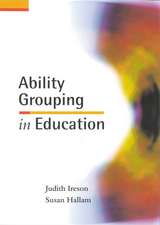Improving Achievement in Low-Performing Schools: Key Results for School Leaders
Autor Randolph E. Ward, Mary Ann Burkeen Limba Engleză Paperback – 24 mar 2004
Preț: 202.45 lei
Nou
38.74€ • 40.03$ • 32.23£
Carte tipărită la comandă
Livrare economică 19 martie-02 aprilie
Specificații
ISBN-10: 0761931740
Pagini: 144
Dimensiuni: 152 x 229 x 9 mm
Greutate: 0.24 kg
Ediția:New.
Editura: SAGE Publications
Colecția Corwin
Locul publicării:Thousand Oaks, United States
Recenzii
"[This] is a valuable book for anyone seriously interested in having more effective schools. This is not a one-shot panacea, but a detailed recipe of what can be done to improve student academic improvement."
Cuprins
Organization of Book
Acknowledgements
About the Author
About the Editor
Step 1. Defining the School's Culture
Understanding Attitude Defined by Actions
Scheduling Effective Communication Mechanisms
Step 2. Gatekeeping by Central Office: Administrators and Principals Teaming Together
Defining a School's Culture to Supports Achievement Goals
Creating Visibility Through Facility Management
Working With Legislators
Receiving Support for Implementing Program Reform Initiatives
Step 3: Creating a Key Results Accountability Process
Understanding How Assessment Indicators Can Increase Student Achievement
Integrating Key Results Into Corrective Action Plans
Identifying School-Site Visitation Lessons
Step 4: Developing Trailblazing Initiatives That Guarantee Student Success
Creating Motivational Attendance Programs
Organizing an Accelerated Learning Program
Providing an Extended School-Year Program
Backloading for Curriculum Alignment
Step 5: Expanding Parent and Community Involvement Activities
Developing Responsive Parent Committees for Critical Feedback
Organizing Community Forums with Diverse Stakeholders
Mobilizing Community Partners to Support Reform Initiatives
Step 6: Enforcing Effective Business Practices
Securing Resources for School Sites
Identifying and Seeking Alternative Program Funding Solutions
Creating a Strategic Plan for Aggressive Grant Development
Conclusion
Resource A: The Results-Based Intervention for School Efficacy (RISE) Project
References
Suggested Reading
Index
Notă biografică
Dr. Randolph E. Ward¿s teaching career spans more than two decades. Fluent in Spanish and English, he has been a teacher in schools in North and South America, including two one-year stints in Colombia and Venezuela. Before becoming the fifth state appointed administrator for the Compton Unified School District in 1996, Dr. Ward was an elementary school principal and an area superintendent for the Long Beach Unified School District.
After a ten year state takeover, Dr. Ward is credited with restoring fiscal and academic responsibility to the Compton Unified School District, a school district that was $20 million in debt and had the lowest test scores in California. Under his leadership the district¿s infrastructure was rebuilt from the ground up in order to build the capacity for student achievement district wide, and ultimately increase test scores four consecutive years. Focusing on student achievement, accountability and safety, he instituted corrective reading, accelerated learning classrooms for retained students, an extended school year, an all day primary learning program as well as many other academic improvement programs. In 2002, 84% of Compton¿s schools improved their Academic Performance Index scores and the percentage of black males graduating from Compton¿s high schools with the required University of California and California State College required courses exceeds the state¿s average.
Dr. Ward trimmed administrative overhead, forged new alliances with the community and district unions, authorized tens of millions of dollars in emergency school repairs, completed a multimillion-dollar facilities modernization and technology infrastructure project, and developed and implemented a Master Facilities Plan. In 2001, CUSD made history by becoming the first state takeover to repay its bankruptcy loan.
To fight grade inflation, Dr. Ward introduced a standardized grading program that relied on course content, writing rubrics, and standards-based assessments. Under his tutelage, staff and student attendance increased, high school graduation rates rose, college enrollments skyrocketed, advanced placement courses vastly expanded, community involvement improved, and the California Achievement Test (CAT5) and Stanford 9 Test scores improved continuously. School crime rates also plunged dramatically, because of initiatives such as school community policing, school site parent safety committees, the We-Tip hotline, mandatory school uniforms in K-8, zero-tolerance for weapons, and the use of enhanced alarm technology throughout the schools in the district.
Dr. Ward¿s nationally recognized environmentally-based school facilities grading program met with so much success that its criteria was expanded to include elements related to academic and instructional site-based programs. His inclusive approach and collaborative leadership style has taken administrators and staff, schools and parents, and the Black and Latino communities to new levels of cooperation and achievement. Dr. Ward has a B.S. in Early Childhood Education from Tufts University, a Masters in School Leadership from Harvard and another in Educational Administration from the University of Massachusetts, Boston. He also has an Ed.D. in Policy, Planning, and Administration from the University of Southern California, Los Angeles.









